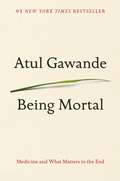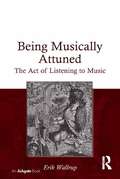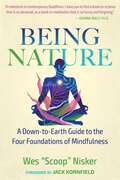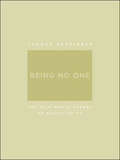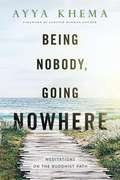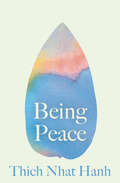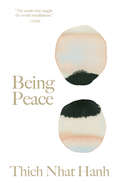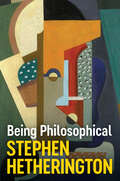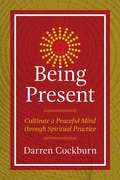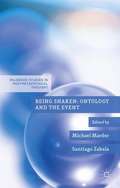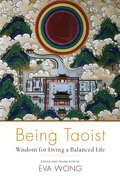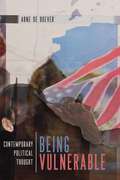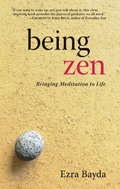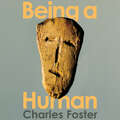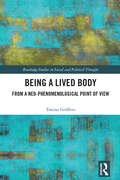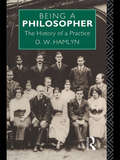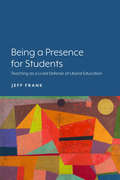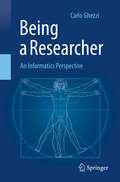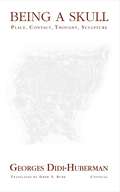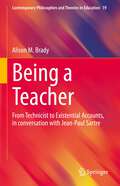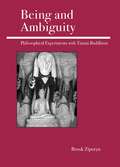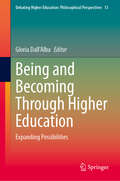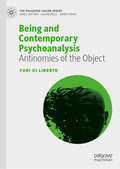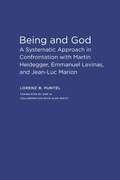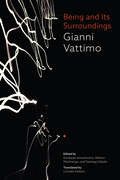- Table View
- List View
Being Mortal: Medicine and What Matters in the End
by Atul GawandeIn Being Mortal, bestselling author Atul Gawande tackles the hardest challenge of his profession: how medicine can not only improve life but also the process of its ending<P> Medicine has triumphed in modern times, transforming birth, injury, and infectious disease from harrowing to manageable. But in the inevitable condition of aging and death, the goals of medicine seem too frequently to run counter to the interest of the human spirit. Nursing homes, preoccupied with safety, pin patients into railed beds and wheelchairs. Hospitals isolate the dying, checking for vital signs long after the goals of cure have become moot. Doctors, committed to extending life, continue to carry out devastating procedures that in the end extend suffering.<P> Gawande, a practicing surgeon, addresses his profession’s ultimate limitation, arguing that quality of life is the desired goal for patients and families. Gawande offers examples of freer, more socially fulfilling models for assisting the infirm and dependent elderly, and he explores the varieties of hospice care to demonstrate that a person's last weeks or months may be rich and dignified.<P> Full of eye-opening research and riveting storytelling, Being Mortal asserts that medicine can comfort and enhance our experience even to the end, providing not only a good life but also a good end. <P><b>A New York Times Bestseller</b>
Being Musically Attuned: The Act of Listening to Music
by Erik WallrupListening according to mood is likely to be what most people do when they listen to music. We want to take part in, or even be part of, the emerging world of the musical work. Using the sources of musical history and philosophy, Erik Wallrup explores this extremely vague and elusive phenomenon, which is held to be fundamental to musical hearing. Wallrup unfolds the untold musical history of the German word for ’mood’, Stimmung, which in the 19th century was abundant in the musical aesthetics of the German-Austrian sphere. Martin Heidegger’s much-discussed philosophy of Stimmung is introduced into the field of music, allowing Wallrup to realise fully the potential of the concept. Mood in music, or, to be more precise, musical attunement, should not be seen as a peculiar kind of emotionality, but that which constitutes fundamentally the relationship between listener and music. Exploring mood, or attunement, is indispensable for a thorough understanding of the act of listening to music.
Being Nature: A Down-to-Earth Guide to the Four Foundations of Mindfulness
by Wes Nisker• Provides a practical program, complete with enjoyable, even playful meditations, for realizing greater self-awareness, increased wisdom, and happiness• Shows how recent discoveries in physics, evolutionary biology, and psychology express in scientific terms the same insights the Buddha discovered more than 2,500 years ago• Reveals the origins of attachments, desires, emotions, and thoughts in our own bodiesTaking us on an evolutionary journey to find the origins of emotions, desires, and thoughts in our own bodies, Wes &“Scoop&” Nisker shows not only how cutting-edge science is proving the tenets of the Buddha but also how we can interpret the traditional practices of Buddhism through this scientific lens for more personal freedom and peace of mind. Using the traditional Buddhist meditation series of the Four Foundations of Mindfulness as a framework, Nisker offers a witty narrative along with practical meditations and exercises to train the mind to overcome painful conditioning and gain greater self-awareness, increased wisdom, and happiness. He shows how recent discoveries in physics, evolutionary biology, and psychology express in scientific terms the same insights the Buddha discovered more than 2,500 years ago, such as the impermanence of the body, where thoughts come from, and how the body communicates within itself. Presenting a variety of new ways to harness the power of mindfulness to transform our understanding of both ourselves and the world, Nisker teaches us how to put our understanding of evolution in the service of spiritual awakening.
Being No One: The Self-Model Theory of Subjectivity
by Thomas MetzingerAccording to Thomas Metzinger, no such things as selves exist in the world: nobody ever had or was a self. All that exists are phenomenal selves, as they appear in conscious experience. The phenomenal self, however, is not a thing but an ongoing process; it is the content of a "transparent self-model." In Being No One, Metzinger, a German philosopher, draws strongly on neuroscientific research to present a representationalist and functional analysis of what a consciously experienced first-person perspective actually is. Building a bridge between the humanities and the empirical sciences of the mind, he develops new conceptual toolkits and metaphors; uses case studies of unusual states of mind such as agnosia, neglect, blindsight, and hallucinations; and offers new sets of multilevel constraints for the concept of consciousness. Metzinger's central question is: How exactly does strong, consciously experienced subjectivity emerge out of objective events in the natural world? His epistemic goal is to determine whether conscious experience, in particular the experience of being someone that results from the emergence of a phenomenal self, can be analyzed on subpersonal levels of description. He also asks if and how our Cartesian intuitions that subjective experiences as such can never be reductively explained are themselves ultimately rooted in the deeper representational structure of our conscious minds.
Being Nobody, Going Nowhere
by Ayya Khema Zoketsu Norman FischerIn this lucid classic, beloved teacher Ayya Khema introduces the reader to the essence of the Buddhist path. She addresses the how and why of meditation, providing a clear framework for understanding the nature of karma and rebirth and the entirety of the eightfold path. With specific, practical advice Ayya Khema illuminates the practices of compassion and sympathetic joy and offers forthright guidance in working with the hindrances that we all encounter in meditation. Few introductory books are both simple and profound. Being Nobody, Going Nowhere is both.
Being Peace
by Thich Nhat HanhTHE BELOVED SPIRITUAL CLASSIC: A timeless introduction to Thich Nhat Hanh&’s most important teachings, revealing the connection between peace in oneself and peace in the world.Now updated with a foreword from Dr. Jane Goodall!One of Thich Nhat Hanh&’s first books published in the United States, Being Peace was intended for peace activists and as a commentary on the peace movement of the time. Now translated into more than 30 languages and with half a million copies sold, it has since become an indispensable guide for anyone concerned about the state of the world and the quality of our lives. Thay&’s message of &“being peace in order to make more peace&” is more relevant than ever. Being Peace contains Thich Nhat Hanh&’s key practices and is filled with practical suggestions for how to create a more peaceful world &“right in the moment we are alive.&” Many of the hallmarks of Thich Nhat Hanh appear here for the first time, in his trademark clear and steady style. Now featuring a foreword from Dr. Jane Goodall, this beautiful, newly revised edition is the perfect starting point for those who are getting their first introduction to Buddhism as well as a must-have for those already engaged in the tradition.
Being Peace: Classic Teachings From The World's Most Revered Meditation Master (Thich Nhat Hanh Classics)
by Thich Nhat HanhBeing Peace is a timeless and eloquent introduction t Zen Master Thich Nhat Hanh and his most important teachings. First published in 1987 and translated into more than thirty languages, this spiritual classic reveals the connection between our own personal happiness and the state of the world around us. Thich Nhat Hanh’s key practices are resented in simple and clear language, offering practical suggestions for how to create a more peaceful world "right in the moment we are alive." Being Peace is a must-have for those interested in Buddhist practice and a perfect starting point for anyone concerned about how to create peace in themselves and the world.
Being Philosophical: An Introduction to Philosophy and Its Methods
by Stephen HetheringtonBeing Philosophical guides readers through the perplexing initial moments of meeting philosophy by taking them inside philosophical thinking as an activity. In a beginner-friendly voice, Stephen Hetherington elucidates how intellectual ‘tools’ from a diversity of traditions, East and West, can enable us to start doing philosophy – that is, to think ‘from scratch’ in a philosophical way. He explores many classical topics and issues that have preoccupied philosophers from Plato, early Buddhists and Confucius to Karl Marx and beyond – selves, souls, identity, will, knowing and reasoning, acting morally, and more – and presents possible methods for responding to different theories. Inviting and conversational, Being Philosophical is the book needed by every new philosophy student – or anyone wondering whether they might want to explore the world of philosophy.
Being Present: Cultivate a Peaceful Mind through Spiritual Practice
by Darren CockburnFree yourself from unhelpful thoughts and emotions and learn to live peacefully in the present • Provides practical exercises, meditations, and reflections centered on mindfulness, breath, and immersion in nature to simplify your life and anchor you in the present • Learn to use your body as a tool for raising consciousness, work with occurrences like tiredness, illness, and pain as spiritual teachers, as well as identify and release addictions, including harmful thought patterns • Can be integrated with any religion or spiritual teaching with examples pertaining to everyday experiences in the Western world Offering a synthesis of spiritual teachings viewed through the lens of modern personal experiences, Darren Cockburn provides practical insight into how to cultivate a peaceful mind, live skillfully, and nurture a spiritual connection through the power of the present moment. The author shares practical exercises, meditations, and reflections, revealing how to free yourself from becoming lost in unhelpful thoughts and emotions, while bringing acceptance to what life presents you with. He explains how to generate true mindfulness through connection to your breath as well as immersion in nature. He details how to use your body as a tool for raising your level of consciousness as well as how to weave exercise, diet, breathing techniques, and sexuality into your spiritual practice. He explores how to work with occurrences like tiredness, illness, and pain as spiritual teachers for enriching your presence of mind and being. The author explains how simplifying life where possible will also bring a better understanding to all types of existing addictions, including harmful thought patterns, providing precious breathing space for our overly busy minds. In addition, he shows how a stable practice of mindful presence can enhance the quality of communication with others, be it with family, with friends, or at work. Alongside an introduction to meditation techniques and supportive wisdom teachings from Buddhist and other spiritual traditions, Cockburn provides useful guidance on successfully integrating a regular spiritual practice into your day-to-day activities. He also includes pointers on how to create your own unique and personal structure in order to support your ongoing spiritual practice, the fruits of which will ultimately be a peaceful, calmer, and more connected experience of life.
Being Shaken: Ontology and the Event
by Santiago Zabala Michael MarderBeing Shaken is a multifaceted meditation by leading philosophers from Europe and North America on ways in which events disrupt the complacency of the ontological paradigm at the personal, ethical, theological, aesthetic, and political levels.
Being Taoist: Wisdom for Living a Balanced Life
by Eva WongTaoism isn't a spiritual extracurricular activity, it's an integral practice for living all of life to the fullest. The modern Taoist adept Eva Wong is your guide to living well according to the wisdom of this ancient system. She uses the ancient texts to demonstrate the Taoist masters' approach to the traditional four aspects of life--the public, the domestic, the private, and the spiritual--and shows how learning to balance them is the secret to infusing your life with health, harmony, and deep satisfaction
Being Vulnerable: Contemporary Political Thought (Outspoken)
by Arne De BoeverWe are living in a time of acute vulnerability. From climate change to drone warfare, terrorist attacks to mass shootings, safe spaces to trigger warnings, not to mention the COVID-19 pandemic, homo vulnerabilis is once again coming to terms with the fact that it can be wounded, or even killed.Against such finitude, sovereignty is now reasserting itself as a political power that might save us from our ontological state. The irony is, of course, that such sovereignty – for example through camps, walls, police violence, or drones – is also the underlying, historical cause of many of our most intense contemporary experiences of vulnerabilization. Interrupting the dialectic by which sovereignty manages to be both the cause of our vulnerabilization and the phantasmatic tool of its prevention, in Being Vulnerable Arne De Boever explores how today’s experiences of vulnerabilization can be translated into a collective human power that dismantles the form of sovereignty that is producing this state of affairs. Focused on theories, paradigms, and alternative formations of sovereignty, Being Vulnerable reconsiders the tradition of thinking through a political concept in order to approach it anew.
Being Zen: Bringing Meditation to Life
by Charlotte Joko Beck Ezra BaydaWe can use whatever life presents, Ezra Bayda teaches, to strengthen our spiritual practice--including the turmoil of daily life. What we need is the willingness to just be with our experiences--whether they are painful or pleasing--opening ourselves to the reality of our lives without trying to fix or change anything. But doing this requires that we confront our most deeply rooted fears and assumptions in order to gradually become free of the constrictions and suffering they create. Then we can awaken to the loving-kindness that is at the heart of our being. While many books aspire to bring meditation into everyday experience, Being Zen gives us practical ways to actually do it, introducing techniques that enable the reader to foster qualities essential to continued spiritual awakening. Topics include how to cultivate: * Perseverance: staying with anger, fear, and other distressing emotions. * Stillness: abiding with chaotic experiences without becoming overwhelmed. * Clarity: seeing through the conditioned beliefs and fears that "run" us. * Direct experience: encountering the physical reality of the present moment--even when that moment is exactly where we don't want to be. Like Pema Chödrön, the best-selling author of When Things Fall Apart, Ezra Bayda writes with clear, heartfelt simplicity, using his own life stories to illustrate the teachings in an immediate and accessible way that will appeal to a broad spectrum of readers. " Ezra Bayda teaches at Zen Center San Diego. He is also the author of Being Zen, At Home in the Muddy Water, Saying Yes to Life (Even the Hard Parts), and Zen Heart. For more information, visit www.zencentersandiego.org. ""Bayda writes with exceptional clarity and simplicity about the awakened life. He has a gift for describing 'ordinary mind,' or the customary thoughts, feelings, and experiences of everyday life. His style is as plainspoken as Pema Chödrön's. He deserves membership in the ranks of respected meditation teacher-authors."--Publishers Weekly "With clarity and compassion, Bayda applies Zen Buddhist principles to everyday life. He explains how all experiences, both pleasant and unpleasant, help us to discover our 'path' to wisdom and an open heart. Presented here are realistic suggestions to help us survive the journey."--Library Journal "Ezra Bayda wisely translates the Eastern spiritual belief into an extremely useful handbook for practice. Being Zen is humble and direct, which reminds me most of Shunryu Suzuki's Zen Mind, Beginner's Mind. It is what its title states--not an explanation of Buddhism or Zen, but an essential guide to its daily practice. Bayda's is a gentle, sharing voice that evenly embraces humor and sincerity, bringing reason and heart-sense to our most irrational behaviors."--Parabola "A skillful wedding of mindfulness and Zen--straightforward, simple, and wise."--Jack Kornfield, author of A Path with Heart and After the Ecstasy, the Laundry
Being a Human: Adventures in 40,000 Years of Consciousness
by Charles FosterA New Statesman Essential Non-Fiction Book of 2021What kind of creature is a human? If we don't know what we are, how can we know how to act? In Being a Human Charles Foster sets out to understand what a human is, inhabiting the sensory worlds of humans at three pivotal moments in our history. Foster begins his quest in a wood in Derbyshire with his son, shivering, starving and hunting, trying to find a way of experiencing the world that recognises the deep expanse of time when we understood ourselves as hunter-gatherers, indivisible from the nonhuman world, and when modern consciousness was first ignited. From there he travels to the Neolithic, when we tamed animals, plants and ourselves, to a way of being defined by walls, fences, farms, sky gods and slaughterhouses, and finally to the rarefied world of the Enlightenment, when we decided that the universe was a machineand we were soulless cogs within it.
Being a Lived Body: From a Neo-phenomenological Point of View (Routledge Studies in Social and Political Thought)
by Tonino GrifferoThis book begins with the distinction between the so-called lived body or felt body (Leib) and the physical body (Körper), tracing the conceptual history of this distinction through key figures in philosophical and social thoughts and articulating a theory of the lived body that draws on the New Phenomenology developed by Hermann Schmitz. An explanation of our being-in-the-world in terms of a felt-bodily communication with all perceived forms and their affective-bodily resonance in us, Being a Lived Body integrates and critically assesses the leading theories of embodiment while presenting a new approach to the body. It will, therefore, appeal to scholars of philosophy, social theory, and anthropology with interests in phenomenology and embodiment.
Being a Philosopher: The History of a Practice
by David W. HamlynFirst Published in 2004. Routledge is an imprint of Taylor & Francis, an informa company.
Being a Presence for Students: Teaching as a Lived Defense of Liberal Education
by Jeff FrankThis book offers a lived defense of liberal education. How does a college professor, on a daily basis, help students feel the value of liberal education and get the most from that education? We answer this question, as professors, each day in the classroom. John William Miller, a philosophy professor at Williams College from 1924-1960 and someone noted for his exceptional teaching, developed one form that this lived defense can take. Though Miller published very little while he was alive, the archives at Williams College hold unpublished notes and essays of this master teacher. In this book, Jeff Frank offers an extended commentary on one of these unpublished essays where Miller develops his thinking on liberal education. Frank develops the idea that presence is central to liberal education and offers suggestions for how professors can become an educative presence for students. The goal of this book is an invitation to other professors who value liberal education to think with Miller about how to develop their own lived defense of liberal education, each day, in their own classrooms. The tone of the book is meant to be invitational, at times even conversational, and the book concludes with some direct suggestions for how professors can live their own defense of liberal education.
Being a Researcher: An Informatics Perspective
by Carlo GhezziThis book explores research from the researchers’ perspective: why to engage in research, what methods to follow, how to operate in daily life, what the responsibilities are, how to engage with society, and the ethical issues confronting professionals in their day-to-day research. The book systematically discusses what every student should be told when entering academic or industrial research so that they can avoid going through the painful process of learning by personal experience and lots of errors. Rather than being technical, it is philosophical and sometimes even anecdotal, combining factual information and commonly accepted knowledge on research and its methods, while at the same time clearly distinguishing between objective and factual concepts and data, and subjective considerations. The book is about scientific research in general and as such holds true for any scientific field. However, it is fair to say that the different fields differ in their research cultures and in their eco-systems. The book reflects the author’s experience accumulated over almost 50 years of teaching graduate courses and lecturing in doctoral symposia at Politecnico di Milano, University of Zurich, TU Wien, Peking University, and at various conferences, and of academic research in informatics (also known as computer science). This book is mainly intended for students who are considering research as a possible career option; for in-progress researchers who have entered doctoral programs; and for junior postdoctoral researchers. It will also appeal to senior researchers involved in mentoring students and junior researchers.
Being a Skull: Site, Contact, Thought, Sculpture (Univocal)
by Georges Didi-HubermanWhat would a sculpture look like that has as its task to touch thought? For the French philosopher and Art Historian, Georges Didi-Huberman, this is the central question that permeates throughout the work of Italian artist Giuseppe Penone. Through a careful study of Penone&’s work regarding a sculptural and haptic process of contact with place, thought, and artistic practice, Didi-Huberman takes the reader on a journey through various modes of thinking by way of being. Taking Penone&’s artwork &“Being the river&” as a thematic starting point, Didi-Huberman sketches a sweeping view of how artists through the centuries have worked with conceptions of the skull, that is, the mind, and ruminates on where thought is indeed located. From Leonardo da Vinci to Albrecht Dürer, Didi-Huberman guides us to the work of Penone and from there, into the attempts of a sculptor whose works strives to touch thought. What we uncover is a sculptor whose work becomes a series of traces of the site of thought. Attempting to trace, by way of a series of frottages, reports, and developments, this imperceptible zone of contact. The result is a kind of fossil of the brain: the site of thought, namely, the site for getting lost and for disproving space. Sculpting at the same time what inhabits as well as what incorporates us.
Being a Teacher: From Technicist to Existential Accounts, in conversation with Jean-Paul Sartre (Contemporary Philosophies and Theories in Education #19)
by Alison M. BradyThis book re-conceptualizes teaching through an engagement with Jean-Paul Sartre’s early existentialist thought. Against the grain of teacher accountability, it turns to the demanding account of being human in Sartre’s thought, on the basis of which an alternative account of teaching can be developed. It builds upon Sartre’s key concepts related to the self, freedom, bad faith, and the Other, such that they might open up original ways of thinking about the practices of teaching. Indeed, given the everyday complexities that characterize teaching, as well as the vulnerabilities and uncertainty that it so often involves, this book ultimately aims to create a space in which to reimagine forms of accounting that move from technicist ways of thinking to existential sensitivity in relation to one’s practice as a teacher.
Being and Ambiguity: Philosophical Experiments with Tiantai Buddhism
by Brook ZiporynBeing and Ambiguity is a brilliant work of philosophy, filled with insights, jokes, and topical examples. <P><P>Professor Ziporyn draws on the works of such Western thinkers as Wittgenstein, Nietzsche, Freud, Sartre, and Hegel, but develops his main argument from Tiantai school of Chinese Buddhism. This important work introduces Tiantai Buddhism to the reader and demonstrates its relevance to profound philosophical issues.Ziporyn argues that we can make both of the claims below simultaneously:This book is about everything. It contains the answers to all philosophical problems which ever shall exist. This book is all claptrap. It is completely devoid of objective validity of any kind.These claims are not contradictory. Rather, they state the same thing in two different ways. To be objective truth is to be subjective claptrap, and vise versa. All interchanges of any kind - conversations, daydreams, sensations - are not only about something but also about everything.Thus, this book concerns itself with no less than the nature of what is and what it means for something to be what it is. It provides a new approach to the basic Western philosophical and psychological issues of identity, determinacy, being, desire, boredom, addiction, love and truth.ems identified, investigated, and resolved-resolved at least in a manner that measures up to the title: Being and Amibguity. But whether it's being or non-being that bothers you, this book has your number, your 'social security' number to be exact, since one of the subtle charms (terrors?) of this book is its commitment to drive philosophy through the carwash of mundane reality, soaking the big German/Buddhist topics in the hot-again-cold-again Real of being-for-the-Other, and the numberless other harrowing tasks that normal life requires. A must read for anyone interested in metaphysical sodomy."-Alan Cole, Author of Text as Father: Paternal Seductions in Early Mahayana Buddhist Literature"Ziporyn carries out an audacious though experiment whose starting point lies in the classical Tiantai idea that being is fundamentally ambiguous. If this idea is valid, he argues, then no philosophical statement can be profound without being vapid. Fully embracing this implication, Ziporyn leads the reader on a fascinating adventure in which Kant, Hegel, Nietzsche, Freud, Heidegger, and many others are seen through the lens of Neo-Tiantai ethics."-Andrew Cutrofello, Author of The Owl at Dawn: A Sequel to Hegel's Phenomenology of Spirit
Being and Becoming Through Higher Education: Expanding Possibilities (Debating Higher Education: Philosophical Perspectives #13)
by Gloria Dall’AlbaThis book focuses on the importance of an ontological dimension for today’s higher education, with critical attention to implications for the student experience, engagement, satisfaction, wellbeing, employability, (dis)embodiment and activism in which students take a stand on their own being and becoming. In accessible language, key philosophical ideas are explored for their relevance to contemporary higher education, integrating philosophical with pedagogical perspectives. Although much of the material has been published previously, there is value in bringing it together into a single volume in exploring an ontological dimension of higher education as it is embodied. In doing so, the book demonstrates benefits to pedagogy through sustained attention to philosophy and theory, and vice versa, thereby contributing to recent heightened interest in the philosophy and theory of higher education. This book is intended to prompt re-imagining the ways in which higher education is conceived and conducted. An argument is put forward for greater emphasis on expanding possibilities for knowing, acting and being, toward fuller lives of interdependence with others and things in an interconnected world. Through highlighting an ontological dimension in this manner, a hope-filled future emerges for higher education.
Being and Contemporary Psychoanalysis: Antinomies of the Object (The Palgrave Lacan Series)
by Yuri Di LibertoThis book explores how philosophical realisms relate to psychoanalytical conceptions of the Real, and in turn how the Lacanian framework challenges basic philosophical notions of object and reality. The author examines how contemporary psychoanalysis might respond to the question of ontology by taking advantage of the recent revitalization of realism in its speculative form. While the philosophical side of the debate makes a plea for an independent ontological consistency of the Real, this book proposes a Lacanian reassessment of the definition of the Real as ‘what is foreign to subjectivity itself’. In doing so, it reframes the question of the Real in terms of what is already there beneath the supposedly linguistic constitution of subjectivity. The book then goes on to engage the problem of cognition in the realm of Nature qua materiality, focusing on the centrality of the body as a linguistic-material hybrid. It argues that it is possible to re-establish the theoretical dignity of Ricoeur’s notion of ‘suspicion’, by building a dialogue between Lacanian psychoanalysis and three main domains of inquiry: desire, objects and bodily enjoyment. Borrowing from Piera Aulagnier’s theory of the Other as a word-bearer, it considers the genesis of desire and sense of reality both explainable through a hybrid framework which comprises psychoanalytical insights and material dynamics in a comprehensive account. This created theoretical space is an opportunity for both philosophers and psychoanalysts to rethink key Lacanian insights in light of the problem of the Real.
Being and God: A Systematic Approach in Confrontation with Martin Heidegger, Emmanuel Levinas, and Jean-Luc Marion
by Alan White Lorenz B. PuntelBeing and God argues that defensible philosophical theorization concerning the topic "God" is both possible and necessary within the framework of an adequate systematic philosophy--which must include a theory of Being--but is not possible in the absence of such a framework. The book provides critiques of philosophical approaches to this topic that have not relied on such frameworks; targets include the most important and influential treatments presented by historical, contemporary analytic, and contemporary continental philosophers. The book also further develops the systematic framework presented in Puntel's Structure and Being (2008), extending a line of argumentation to show that the absolutely necessary dimension of Being is, when more fully explicated, appropriately named "God."
Being and Its Surroundings
by Gianni VattimoGianni Vattimo, one of Europe's foremost contemporary philosophers and most famously associated with the concept of weak thought, explores theoretical and practical issues flowing from his fundamental rejection of the traditional Western understanding of Being as an absolute, unchanging, and transcendent reality. The essays in this book move within the surroundings of Being without constructing a systematic, definitive analysis of the topic. In Being and Its Surroundings, Vattimo continues his career-long exploration of the philosophy of Martin Heidegger, in particular his repudiation of metaphysics with its presupposition of the existence of permanent, universal truth, and that of Friedrich Nietzsche, with its promotion of nihilism. One consequence of problematizing the idea of an attainable truth is the relativization of values and cultures. In the face of the death of God – or the absence of a transcendent guarantor of the validity of human judgments – we have the postmodern tendency to see all value systems and assertions of truth as purely subjective, and to suggest that "anything goes," which Nietzsche called passive nihilism. Vattimo advocates a more active response as he challenges all forms of authoritarianism in the world today. He brings his intellectual acumen to bear on such urgent issues as globalization, the clash of civilizations and terrorism, the crisis of democracy, and the relevance of orthodox religion. Rather than endorse dogmatism or indifference and detachment from social engagement in the name of relativism, Vattimo opts for the path of meaningful dialogue and a search for a mediated consensus based on reason, with all its limitations.
